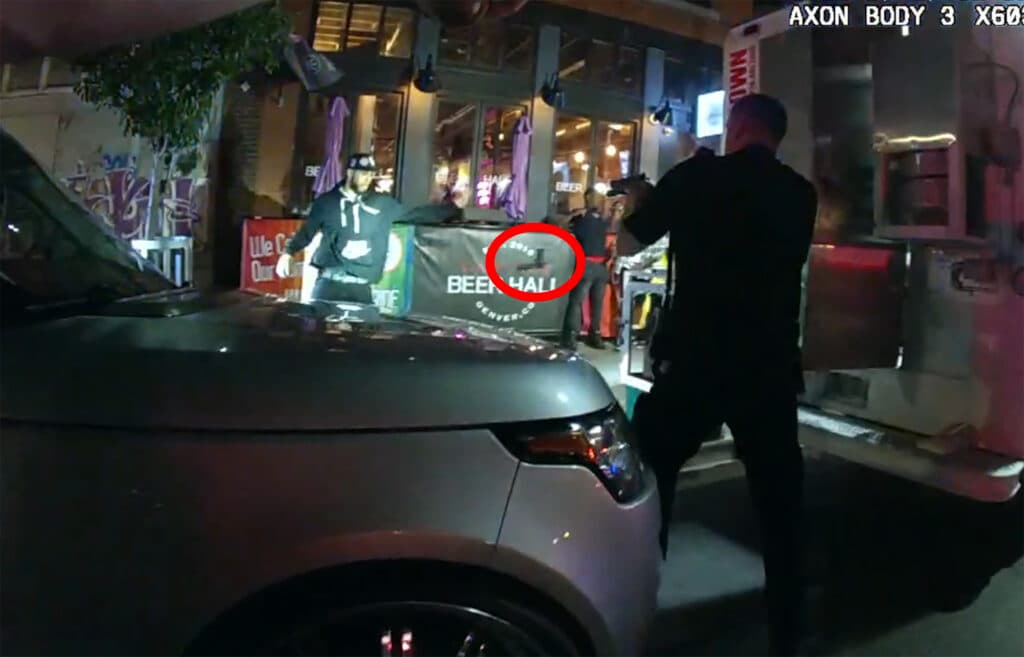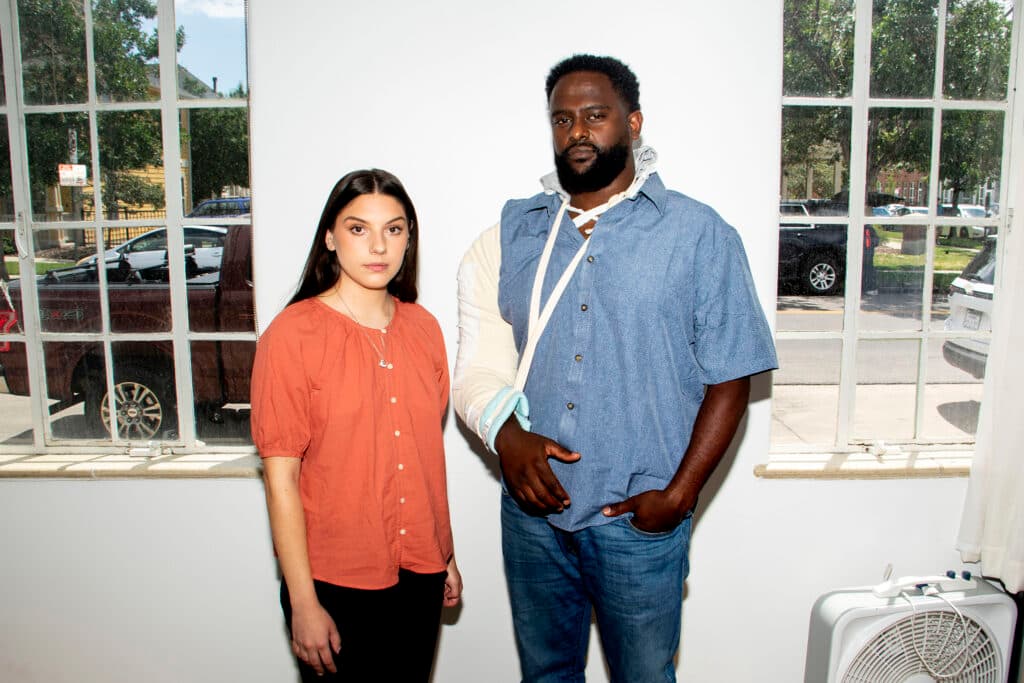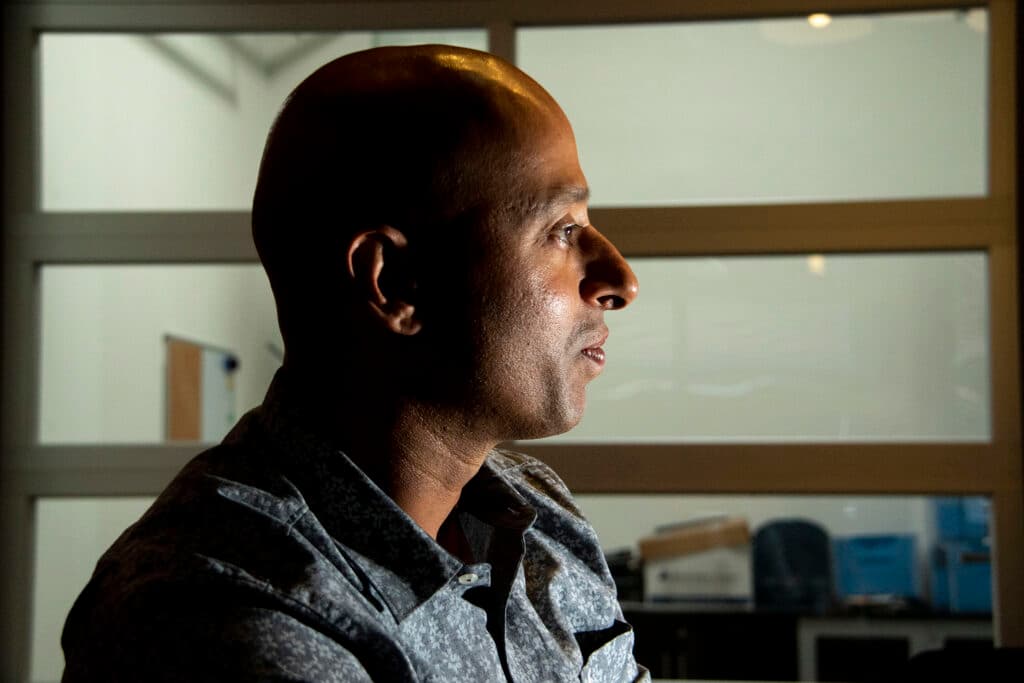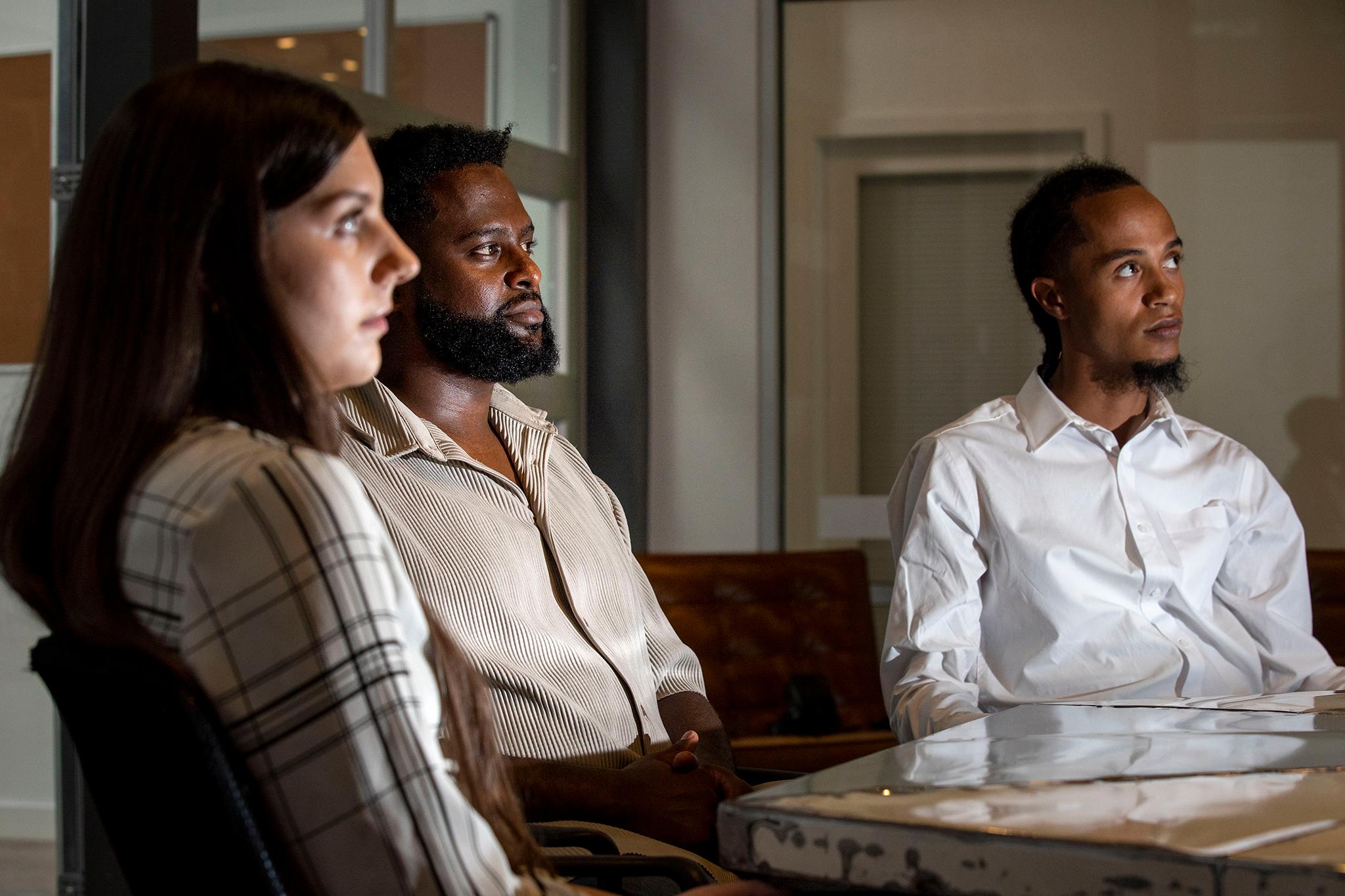A Denver jury awarded six people collectively $20 million after a Denver Police officer accidentally shot them during a confrontation with a suspect in 2022 — it is among the biggest jury awards in the state’s history for police misconduct.
But the victims may never see a penny of it from the city of Denver.
It’s one of the first tests of a George Floyd-era state police reform law that attempted to hold cities and law enforcement officers financially accountable for egregious mistakes on the job — and lawyers are trying to outsmart it.
Reporting by Denverite and CPR News shows that the city of Denver paid $1 million for an attorney to represent Ramos. That attorney convinced the judge to excuse the city from any financial responsibility in the case.
The result is that, for now, only Ramos himself will be responsible for paying the settlement, making it much less likely that the plaintiffs will get the full sum.
City officials defended the move, saying they were just following the allowances of the law. But some of the plaintiffs and their attorneys say the city of Denver is defying the intent of police accountability laws.
The case started with gunshots downtown.
The case dates back to July 2022 — it was 1:30 a.m., last call on Larimer Street in Lower Downtown Denver.
Denver officer Brandon Ramos and two of his colleagues saw a man, Jordan Waddy, punch another person outside a bar and flash signs that he was armed, according to court documents. Waddy then fled. When the three officers caught up to him, guns drawn, Waddy could be seen in body-worn camera footage removing a firearm from the hooded jacket he was wearing.

All three officers fired shots. Two of those officers fired directly at Waddy, who fell to the ground with non-fatal injuries. Ramos fired toward Waddy, too, but also into a crowd of bystanders near a food truck.
Ramos was eventually both criminally charged and sued by the six bystanders hit by shots and shrapnel.
In his criminal case, Ramos pleaded guilty to third-degree assault and was sentenced to probation. He also relinquished his Colorado peace officer’s license.
But who should pay?
In the civil case, lawyers working on behalf of the bystanders sued under one of Colorado’s police reform bills passed in the immediate wake of George Floyd’s murder in Minnesota.
SB20-217 was the law passed by both Republicans and Democrats. And despite its bipartisan support, it was divisive at the time among police officers because it made clear that officers could be responsible for up to $25,000 in any civil claim stemming from on-duty conduct.
The cities or counties the law enforcement officers work for are supposed to cover the rest, the law says. In plain language, the law also states that even if the officer can’t pay the $25,000, the counties and cities are supposed to cover that too.
Authors of Colorado’s police reform law — passed during a truncated legislative session amid the pandemic and flaring tempers against police violence — say the intention was to go way above what was already tendered in federal law.
There are primarily two provisions in federal law protecting citizens against police abuses. One allows the Department of Justice to investigate officers who “willfully deprive people of their constitutional rights” while in uniform. A person can also individually sue an officer in federal court, but in order for a municipality or a county to cover that — even if the officer was on-duty — there is a high burden to prove that the city trained that person incorrectly.
“What did SB217 mean to do? Here in Colorado, our intention is that people should be entitled to enhanced legal protection from law enforcement abuses,” said civil rights attorney Mari Newman, who helped author SB217 with lawmakers.
Yet, at least so far, it hasn’t worked that way in the Ramos case.
The city of Denver paid a private attorney, Peter Doherty, to represent Ramos.
A contract obtained by CPR News shows a $1 million agreement with Doherty, which also allows for the city to have full authority on what was agreed upon in any settlement for as needed services. The city confirmed this arrangement and Doherty was supposed to represent Ramos.
Newman, who has represented dozens of people suing cities and counties for police violence and settled multiple multi-million dollar lawsuits, said she’s never seen an agreement like that before.
“I’m very surprised to see the provision in there that gives the city the opportunity to review and approve briefs on behalf of someone other than the city,” she said. “The payor is making legal decisions instead of the actual represented party.”
Early on in the case, more than a year ago, Doherty filed what is a pretty standard motion for summary judgment, basically asking for the case to be dismissed and for the city to get out from under SB217’s requirements.
Doherty’s request essentially removed all of the safety valves built in under the state law for both plaintiffs and police officers to be kept whole and not have their personal finances devastated.
The attorneys representing the bystanders argued in court filings against the motion, saying it doesn’t honor the state’s police accountability laws.
“It strains logic, basic notions of fairness, and our veneration of the liberties safeguarded by the Colorado constitution to reason that Plaintiffs were not seized when Ramos knowingly fired his gun toward a crowd of people intending to make a seizure,” the lawyers said, according to court documents. “The (state law) was intended to depart from the rigorous standards of federal precedent protecting government actors and specifically eradicates qualified immunity as a defense.”
But the judge sided with Doherty and the city of Denver, stripping the case of requirements to follow Colorado’s police accountability law.
By doing so, the judge also technically excluded the city’s responsibility to pay any potential settlement or ruling.
Will the settlement get paid?
The case then proceeded to a civil jury trial. The jury found earlier this month that the officer was “willful and wanton” in his actions that night and awarded the six bystanders not only money for their economic and non-economic losses but also a punitive award.
When asked for comment, a city spokesperson said the lawsuit didn’t have anything to do with the local government and was between Ramos and the plaintiffs — even though CPR News later learned the city paid Doherty on behalf of the officer.
Yekalo Weldehiwet, who was shot in the arm by Ramos and had to have surgery on his humerus bone, said he felt relieved when the jury trial was over and the jury awarded him more than $4.5 million in economic, non-economic, permanent disfigurement and punitive damages, according to the verdict form.
Weldehiwet, now 29, believes Denver should take responsibility.
“They're the ones who trusted him and who trained him to do what he did. Right?” he said. “They're the ones who entrusted him to protect the public, which he acted recklessly. He was on the job performing what they trained him to do, and now, instead of taking accountability for his actions … they're saying we don't have anything to do with it. I just find it mind-boggling.”

Doherty, the private attorney paid by the city to represent Ramos, declined to comment in a brief phone call before hanging up. He did note that he wanted to thank the jury for their service.
In an email, the Denver City Attorney’s Office said it wasn’t unusual for the city to pay outside counsel to represent police officers and noted that when an officer pleads guilty to committing criminal conduct on the job, the city does not have to pay any judgment against the officer.
“Obtaining dismissal of the (state law) claims on the summary judgment did not leave Ramos on the hook,” the office said. “It potentially saved him from a judgment for a constitutional violation.”
Attorneys for the plaintiffs disagree. And they say they aren’t backing down.
They say the spirit of the law is that police, and the governments that employ them, bear responsibility for egregious mistakes on the job. They plan to go to the Colorado Court of Appeals and ask the higher court to review the district court judge’s decision to excuse Denver from financial responsibility and to further clarify what responsibility municipalities and counties bear in cases like this.
They also say they’ll go after Ramos himself for the money, if they have to.
“We are 100 percent going to chase Ramos into bankruptcy,” said Siddhartha Rathod, one of the lawyers for the six bystanders. “We’re going to send a message to every police officer that your employer is hanging them out to dry. We’re going to come after their personal assets, their cars, their marital estates, we’ll garnish their wages because their employer thinks they shouldn’t be responsible for the employees of their own police department.”
What does the law say?
Stories of law enforcement officers misusing their weapons, either intentionally or unintentionally, have created mixed case law dating back decades. Lawyers who represent both officers and people injured by officers say it’s kind of all over the place.
Officers who misfire their weapons and accidentally hit someone can yield a negligent homicide criminal charge or a simple civil settlement with the officer eventually continuing to work. Equally variable, lawyers say, is case law for situations like what happened with former Officer Ramos, when an officer intended to use his lethal weapon but hit the wrong target.
“The answer as to who should pay the judgment awarded by a Denver jury is simple. That answer is the city and county of Denver. If the Denver mayor respected the rule of law, respected the verdict of a jury, then they need to pay it,” Rathod said. “What’s insane here is that the city and county of Denver paid for the lawyer and then that lawyer filed a motion that was in the city’s benefit — but adverse to Officer Ramos’ benefit.”

Seth Stoughton, a law professor at the University of South Carolina and a former law enforcement officer, said that generally speaking, in both state and federal law, employers are responsible for employees who make mistakes that hurt people on the job. This ranges from someone working at Walmart to a law enforcement officer.
He said, though, that this liability usually stops when someone is proven to have been willful in their actions — for example, Stoughton said, if they tried to hurt someone on the job and knew what they were doing was wrong and that it didn’t have anything to do with the “scope of their duties.”
“If a Walmart employee kidnaps someone, that obviously has nothing to do with the work,” said Stoughton, who is a director of the Excellence in Policing and Public Safety program at the university. “The employee is off on a frolic of their own having nothing to do with their job duties.”
What complicates the Ramos case is this “willful and wanton” finding by the jury. The question is, did Ramos intend to hurt people?
Lawyers on both sides acknowledge that, no, Ramos didn’t likely intend to injure innocent people. But the jury found that his conduct was so outside the training and the regular standard of police behavior that he was responsible for punitive damages too.
“I hear what the city is saying, like, ‘Hey there was a finding that this misconduct was willful and wanton, it’s not our responsibility,’” Stoughton said. “On the other hand, I can hear the plaintiffs saying, ‘It may have been willful and wanton, but it was in the scope of his duties. Even if he did it badly.’”
‘Cities are starting to look a little harder at some of the more egregious cases.’
Stoughton says he recently has had conversations with attorneys representing cities and counties for police misconduct and that there is a movement afoot: They are going to start fighting back against lawsuits on police violence more aggressively.
The National Police Funding Database, run by the Thurgood Marshall Institute, estimates that cities and counties have settled more than $2 billion in police violence lawsuits since Floyd’s murder.
“I think given events of the last four or five years, anecdotally, I think cities are starting to look a little harder at some of the more egregious cases,” Stoughton said. “When they have an officer that does something that is egregious, when an officer does something that is so far outside the bounds of expected professional competency … then cities are starting to say, why are they covering their expenses?”
A whole lot of people directly involved in the Ramos case didn’t comment for this story.
Ramos didn’t return calls and a text message for comment. He and his wife, also a police officer, have since moved to Florida. The Denver police union also declined to comment and didn’t return several calls and emails. Paul Pazen, Denver’s former police chief who was at the helm during the LoDo shooting also declined to talk about the Ramos case or, even, broader implications for Denver officers’ liabilities given the city’s position.
The city attorney declined an interview or further comment beyond a few emailed sentences without a name attached.
Bailey Alexander, 27, said three years after she was shot in the shoulder by Ramos, she was exhausted at the specter of another fight.
Alexander said she still has about $30,000 in medical debt from the incident and was turned into collections, even though she had health insurance at the time. The jury found her economic and emotional tolls were worth more than $4 million, which includes a punitive payment too, and awarded her that.
“It's been a very hard three years,” Alexander said. “Now it's just another fight in regards to getting any sort of compensation or anything. We're just sitting here, all of us victims are still sitting here with, you know, mass amounts of medical debt and severe anxiety and it's definitely frustrating.”













